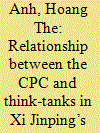| Srl | Item |
| 1 |
ID:
186857


|
|
|
|
|
| Summary/Abstract |
Providing high-level policy advice to developing countries with the purpose to shape national policies is a key function of the UN. Yet no official UN definition of policy advice exists and little is known on how much weight the UN gives to this support modality in contrast to capacity-building and implementation work. To address this gap, this article first articulates the case for the UN’s role in policy change. It then presents an empirical analysis of the policy advice landscape of the UN, providing a numerical estimate of the share of resources dedicated to policy advice and identifying five practical constraints on the UN’s policy advice function. Results suggest that, despite high expectations, the UN’s fieldwork is not strategically focused on policy advice. This article contributes to the underresearched field of UN development work and how it is, or should be, shaped by the UN’s multilateralism.
|
|
|
|
|
|
|
|
|
|
|
|
|
|
|
|
| 2 |
ID:
186832


|
|
|
|
|
| Summary/Abstract |
This article reviews the ideology, guidelines, and policies of the Communist Party of China (CPC) on think-tanks and especially focuses on analysing Xi Jinping’s policies towards them since the 18th Party Congress in 2012. Observing both the CPC’s directives and the activities of some important think-tanks, this article finds that the relationship between the CPC and think-tanks in China has gotten increasingly closer. The closeness is reflected in indicators such as the CPC’s promulgation of the policy to build ‘a new type’ of think-tank, increasing reliance on and appreciation for the advice of think-tanks, funding for official think-tanks, and frequent emphasis on the absolute leadership of the CPC over them. This is a typical model of the corporatism between the CPC and the state, market and social organisation in China.
|
|
|
|
|
|
|
|
|
|
|
|
|
|
|
|